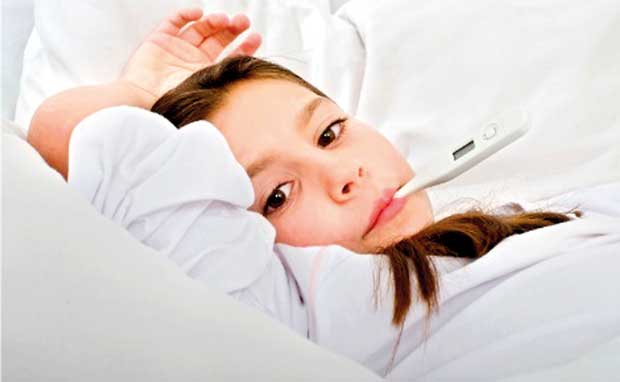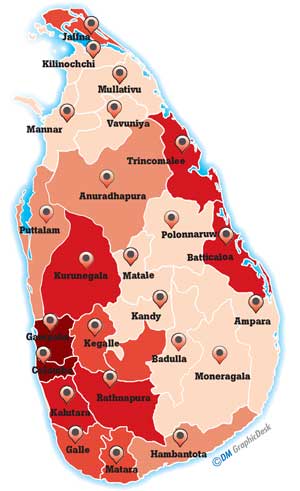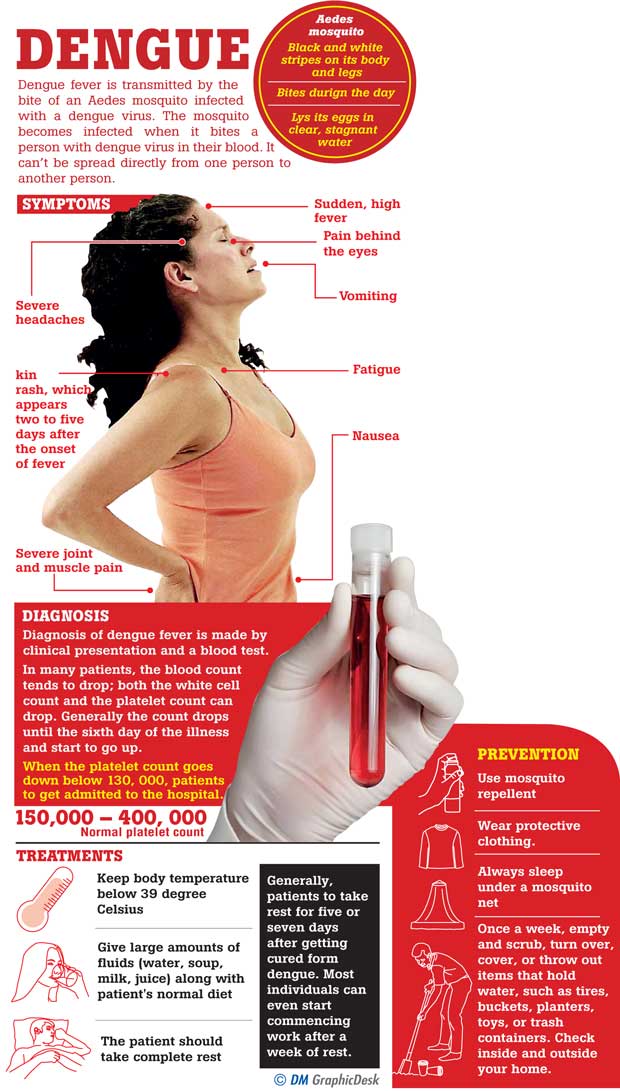21 Jun 2017 - {{hitsCtrl.values.hits}}

Dengue has raised its head more viciously than ever before, with the onset of the monsoon season. Hospitals are overflowing with dengue patients and healthcare workers everywhere are undergoing a fierce battle to monitor and treat patients with the limited staff they have. We, as responsible citizens of the country cannot wash our hands off the topic, leaving the care of patients to hospital staff and the government. The carriers of dengue are bred all around around us, in our gardens and workplaces, without out noticing. Therefore, if each of us did our part, we as a nation could eliminate this disaster from its roots.
By Punnami Amarasinghe & Gayan Suriyarachchi
There is a saying among soldiers that you can never have too much information on your enemy. This is why the Health Capsule decided to interview Dr. Indika Ellawala, Chief Medical Officer of Health, Rathmalana, to take you through the basics of dengue, starting from the virus and the carrier to the disease, treatment and most importantly, prevention. Read on if you want to become an active soldier in the battle against dengue.

Dengue is a disease transmitted by a virus. There are four basic types of dengue viruses, Type 1, 2, 3 and 4. Since a single virus can make you sick only once, this basically means you could get dengue four times in your life. Don’t be alarmed though, because most of the time, dengue acts similarly to other viral fevers and you might have even developed the disease previously without your knowledge.
Talking about the transmission of dengue, the virus enters the bloodstream through two mosquito breeds, the Aedes Aegyptii and Aedes Albopictus. The female mosquito usually lays eggs in clear water. Just a few spoonfuls of water is enough for them to survive. So, in addition to susceptible places like yoghurt cups, empty coconut shells, flower vases and tyres, inspect unlikely places like empty polythene bags or plant stems where water could collect.
According to Dr. Ellawala, the female mosquito gets infected when it bites a person who has the virus in his or her bloodstream. In addition, the eggs laid by an infected female mosquito also leads to the hatching of mosquitoes that carry the virus. When these mosquitoes bite an uninfected person, they release the virus into the bloodstream. The first symptoms of the disease appear 5-7 days after an infected mosquito bite.
Dengue can be usually present in two forms, says Dr. Ellawala.
1) Dengue fever
2) Dengue Haemorrhagic fever
“Symptoms of dengue are the sudden onset of high fever, severe headaches, pain behind the eyes, vomiting and muscle and joint pain. Dengue haemorrhagic fever is deadly and early diagnosis and treatment is crucial. If the fever lasts for more than two days, a full blood count will make diagnosis easier. A dengue Antigen Test can be performed with the onset of fever”, says Dr. Ellawala.

“In dengue haemorrhagic fever, bleeding and shock may sometimes occur,” he continued.
“Symptoms of bleeding usually occur after 3-5 days of fever. If the patient is going into shock, additional symptoms like severe abdominal pain, bleeding from gums, skin bruising, frequent vomiting with blood and black stools resembling tar can occur.” According to him, pale cold skin, restlessness and irritability are also signs of shock.
If you suspect you have dengue fever, your doctor will decide if you should be admitted to hospital or not after considering your report results, age and general condition.
“In case of home management, the patient should rest and take adequate fluids (water, soup, fruit juice) to bring down the fever. The only drug recommended is Paracetamol”. Dr. Ellawala also advises patients to sleep under a mosquito net.
“Since dengue is a viral disease, the virus will be removed by our own immune system without the need for medication. We have to let the body do its own work. In a hospitalized patient, the main method of management is through fluid and frequent monitoring, done by checking the vital signs and conducting ultra sound scans of the body. If the patient is going into shock, resuscitation is done. Early diagnosis is essential in Dengue”, stresses Dr. Ellawala. He further adds that most dengue casualties so far were due to late diagnosis and seeking of medical care when the patient was critical.
While managing patients is important, preventing the disease occurring in the first place would be the most effective method to combat it. In addition to the obvious benefits to people, it will benefit the government as a whole because the huge expenditure spent on diagnosis and treating the ever-increasing number of dengue patients will be spared. “It is found that in most cases, the source of dengue is in the house of the patient itself”, comments Dr. Ellawala. Therefore, it’s our duty to clean the environment of mosquito breeding grounds before pointing fingers at the government and at other officials.
Many of us have made it a point to clean our premises when we heard that a visit from Public Health Inspectors was due soon, since we fear legal action. According to Dr. Ellawala, this is not how it should be, especially at a time like this, where dengue is spreading like wildfire. We should keep our surroundings clean, not because of the fear of the “dengue inspections”, but because as responsible citizens, it’s our duty to safeguard our family and neighbours from this deadly disease.
He advises that special attention should be given to roof gutters while cleaning premises of mosquito larvae. “While at it, take care to participate in cleaning your workplace or school as well. The fact that the dengue-carrying mosquito is a ‘day biting’ mosquito, makes this practice even more important since we spend most of our day time in these places. ”
So the take-home messages from this article are to seek medical advice in case of a fever, especially in dengue endemic areas, refraining from using painkillers except paracetamol in case of fever and seeking immediate medical care if you develop any symptoms associated with fever. Last but not least, contribute to the ongoing battle against dengue in the best way you can, by destroying possible mosquito breeding grounds around you. This is because the most vulnerable point in the dengue cycle is the larvae stage, which is within our reach, in the breeding grounds supplied by ourselves.

23 Dec 2024 9 hours ago
23 Dec 2024 23 Dec 2024
23 Dec 2024 23 Dec 2024
23 Dec 2024 23 Dec 2024